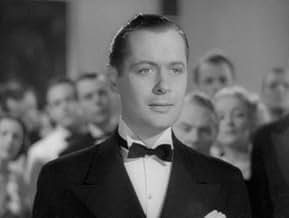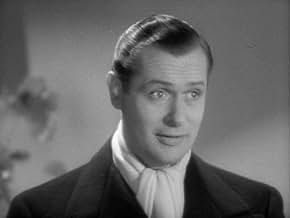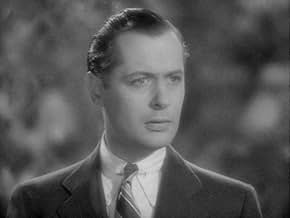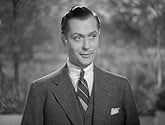Agrega una trama en tu idiomaA society girl tries to reform her playboy husband by making him jealous.A society girl tries to reform her playboy husband by making him jealous.A society girl tries to reform her playboy husband by making him jealous.
- Dirección
- Guionistas
- Elenco
- Premios
- 3 premios ganados en total
Charles Ruggles
- Edgar
- (as Charlie Ruggles)
Joan Fontaine
- Caroline
- (as Joan Burfield)
John David Horsley
- Duffy
- (as David Horsley)
E.J. Babille
- Desk Clerk
- (as E.J. Babiel)
Jean Acker
- Nightclub Extra
- (sin créditos)
Gertrude Astor
- Nightclub Extra
- (sin créditos)
Clem Beauchamp
- Drunk
- (sin créditos)
Brooks Benedict
- Joe Williams - Bar Owner
- (sin créditos)
Veda Buckland
- Marcia's Maid
- (sin créditos)
Opiniones destacadas
Broadway must have had dozens of these drawing room comedies featuring rich, well-dressed people speaking snappily to one another. I say "must have" because Hollywood seems to have adapted all of them. "No More Ladies" is yet another one, and for my money, it's pretty routine. Joan Crawford is a rich girl in love with a cad, played by Robert Montgomery. They marry and he's still a cad. In fact, instead of going to their country house one weekend, he delays his trip and has a dalliance with a woman named Therese. He admits this when he finally shows up in the country. He has little choice when he learns that his alibi, Charlie Ruggles, is actually at the country home. In retaliation, Crawford invites an old beau and a couple of ex-girlfriends to a huge party.
The dialogue is witty, the clothes are glamorous, the apartment and house are sumptuous, and the performances are very good. Montgomery was always perfect in these roles, and Crawford is attractive and spars with Montgomery well. Edna Mae Oliver is superb as always. Charles Ruggles plays a somewhat annoying drunk. Gail Patrick, who became Gail Patrick Jackson and produced "Perry Mason," having married Erle Stanley Gardner's agent, does very well as the pretty other woman.
This is one of those films where one asks, so why wasn't I crazy about it? The only reason is that there was a sameness about it and nothing really to differentiate it - including the cast - from all the other light, romantic comedies. It's no wonder that Robert Montgomery fought so hard to make "Night Must Fall." He was incredibly bored with these roles. It's understandable.
The dialogue is witty, the clothes are glamorous, the apartment and house are sumptuous, and the performances are very good. Montgomery was always perfect in these roles, and Crawford is attractive and spars with Montgomery well. Edna Mae Oliver is superb as always. Charles Ruggles plays a somewhat annoying drunk. Gail Patrick, who became Gail Patrick Jackson and produced "Perry Mason," having married Erle Stanley Gardner's agent, does very well as the pretty other woman.
This is one of those films where one asks, so why wasn't I crazy about it? The only reason is that there was a sameness about it and nothing really to differentiate it - including the cast - from all the other light, romantic comedies. It's no wonder that Robert Montgomery fought so hard to make "Night Must Fall." He was incredibly bored with these roles. It's understandable.
In the past 24 hours, I watched two 1930s comedies -- MERRILY WE LIVE and NO MORE LADIES.
IDMB users seemed to like MWL far more than I did. Many of the actors brought little to their roles in that film, and there's not a snappy bit of dialogue in the whole picture.
NML, on the other hand, is very witty, very well-acted, and quite entertaining. Yes, it might have been even better with someone other than Joan Crawford in the female lead, but Robert Montgomery is very strong and this was the most enjoyable work I'd ever seen Edna May Oliver deliver.
And I don't think, as one reviewer suggested, the Code impacted this movie very much -- in fact, it comes as being quite Pre-Code in nature. If you didn't know when it was made, one might easily guess it was pre-, not post-, code.
In short, not a classic, but quite snappy and entertaining and well worth watching.
IDMB users seemed to like MWL far more than I did. Many of the actors brought little to their roles in that film, and there's not a snappy bit of dialogue in the whole picture.
NML, on the other hand, is very witty, very well-acted, and quite entertaining. Yes, it might have been even better with someone other than Joan Crawford in the female lead, but Robert Montgomery is very strong and this was the most enjoyable work I'd ever seen Edna May Oliver deliver.
And I don't think, as one reviewer suggested, the Code impacted this movie very much -- in fact, it comes as being quite Pre-Code in nature. If you didn't know when it was made, one might easily guess it was pre-, not post-, code.
In short, not a classic, but quite snappy and entertaining and well worth watching.
The unoriginal plot, about a rich married couple dealing with problems of infidelity, is secondary here to the clever dialogue by Donald Ogden Stewart, who wrote the screenplay to The Philadelphia Story, and to a strong supporing cast. Joan Crawford is fine, but Robert Montgomery and Franchot Tone, fighting for Crawford's hand, wind up being nearly indistinguishable from each other, both in looks and in character. That leaves the supporting cast to rescue the film: Charles Ruggles has a fun bit as a slurring drunk and Arthur Treacher comes in at the end as a stuffy Brit who mumbles loudly and misuses American slang. Even Gail Patrick, who isn't normally given much to do in her man-stealing parts, is fine here. But the best is Edna May Oliver, playing the wise and witty matriarch--she steals every scene she's in and was the main reason I finished watching the movie.
For sporadic moments of amusement "No More Ladies" is perfectly satisfactory. It has the MGM lusciousness and gleam that the other studios envied. Note the great looking costumes on Joan Crawford, Joan Fontaine, and Gail Patrick wear. The sophistication is showed by the ho-ho-ho jokes that are dropped by the likes of Crawford, Robert Montgomery, Franchot Tone, and Edna Mae Oliver. This is the type of film that has the hero with a name like "Sherry". People go to night clubs, and to fancy restaurants, and take drives in Central Park at night (it is, after all, the 1930s).
The film is a bore - it occasionally amuses because of the cast, but the dialog is brittle for the sake of brittle. It is Noel Coward's world but not the real wit he brought - Coward's best plays show a streak of harshness and mutual malevolence mixed with affection in his couples like Amanda and Elyot in "Private Lives". They also tend to be smarter than the characters here.
Also the characters are not all that amusing nowadays. Montgomery's cousin is Charlie Ruggles, who is constantly drunk. Ruggles is a favorite comedian to me, but here he was dull. Reginald Denny is around as a British version of Ralph Bellamy - an available alter-suitor to Montgomery for Crawford, and while Denny is elegant (in a skittish sort of way) he is not at all as amusing as Ralph Bellamy was in "His Girl Friday" or The Awful Truth".
After watching this film I stopped to consider the three leads. Montgomery was typecast for most of the 1930s (except for an occasional film like "The Big House") as a happy, amoral socialite. Nobody really played the upper-crust cad as well as he did, but he got bored by it, and fought for meatier parts - and after his brilliant Danny in "Night Must Fall" he got them. Crawford reveled in parts like the hard-working lower class girl fighting her way to happiness, but she did many "socialite" parts as well. Along came "The Women", and she played a villainous social climber. After that came the really hard-boiled darker parts of the 1940s and 1950s like "Mildred Pierce" and "A Woman's Face" and "Flamingo Road". Tone, in 1935, would start having roles like Bryam in "Mutiny On The Bounty" - like Montgomery he would play his wealthy cads, but he would be able to step into nastier, meatier roles like "The Phantom Lady" and "The Man On The Eiffel Tower". When one talks to their fans about the great work of these three actors, it is the films where they played characters with demons after them that are recalled. Few really recall a piece of meaningless cotton candy like "No More Ladies" regarding any of them.
The film is a bore - it occasionally amuses because of the cast, but the dialog is brittle for the sake of brittle. It is Noel Coward's world but not the real wit he brought - Coward's best plays show a streak of harshness and mutual malevolence mixed with affection in his couples like Amanda and Elyot in "Private Lives". They also tend to be smarter than the characters here.
Also the characters are not all that amusing nowadays. Montgomery's cousin is Charlie Ruggles, who is constantly drunk. Ruggles is a favorite comedian to me, but here he was dull. Reginald Denny is around as a British version of Ralph Bellamy - an available alter-suitor to Montgomery for Crawford, and while Denny is elegant (in a skittish sort of way) he is not at all as amusing as Ralph Bellamy was in "His Girl Friday" or The Awful Truth".
After watching this film I stopped to consider the three leads. Montgomery was typecast for most of the 1930s (except for an occasional film like "The Big House") as a happy, amoral socialite. Nobody really played the upper-crust cad as well as he did, but he got bored by it, and fought for meatier parts - and after his brilliant Danny in "Night Must Fall" he got them. Crawford reveled in parts like the hard-working lower class girl fighting her way to happiness, but she did many "socialite" parts as well. Along came "The Women", and she played a villainous social climber. After that came the really hard-boiled darker parts of the 1940s and 1950s like "Mildred Pierce" and "A Woman's Face" and "Flamingo Road". Tone, in 1935, would start having roles like Bryam in "Mutiny On The Bounty" - like Montgomery he would play his wealthy cads, but he would be able to step into nastier, meatier roles like "The Phantom Lady" and "The Man On The Eiffel Tower". When one talks to their fans about the great work of these three actors, it is the films where they played characters with demons after them that are recalled. Few really recall a piece of meaningless cotton candy like "No More Ladies" regarding any of them.
You've seen it all before, folks--another tiresome romantic comedy, unredeemed by an accomplished cast and the trademark MGM gloss. Joan Crawford is especially wasted in the airy proceedings; her dramatic intensity has no outlet here, and she is forced to rely on her lesser skills as a sophisticated comedienne. This is Carole/Claudette/Irene territory, and, although Joan can give these ladies cards in spades when it comes to glamour, she lacks their lighter touch. I suspect two forces were at work here: the Production Code of 1933, which forced out earthy drama and bawdy comedy and pushed stars like Harlow and Crawford into fluff, and the "Norma" syndrome at MGM, which forced Crawford to take Norma's castoff parts. (No wonder Joan ended up "box-office poison" shortly after pictures like this alienated her fan base!) If you'd like to see Joan in comedies more suited to her persona, check out her splendidly bitchy Crystal in "The Women", or as the clueless Susan in "Susan and God".
¿Sabías que…?
- TriviaBig-screen debut of Joan Fontaine (listed as Joan Burfield).
- ErroresWhen Sherry and Fanny are talking in front of the fireplace, from one scene to the next his position changes back and forth. First he's standing and facing Fanny, who is sitting as they talk; then he is to her side, kneeling on a sofa bench with his back to her and leaning on the fireplace hearth. Then he is back opposite her, standing and facing her as they talk; then he's back kneeling on the sofa and leaning on the hearth. Then he's once again standing and facing Fanny.
- Citas
Oliver Allen: Look here, you can't go up there--she might be in bed!
Sheridan 'Sherry': Since when has a lady in bed been an object of repugnance?
- ConexionesFeatured in Joan Crawford: The Ultimate Movie Star (2002)
- Bandas sonorasAll I Do Is Dream Of You
(1934) (uncredited)
Music by Nacio Herb Brown
Lyrics by Arthur Freed
Played on banjo by Arthur Treacher and
Sung by Gail Patrick at the party
Selecciones populares
Inicia sesión para calificar y agrega a la lista de videos para obtener recomendaciones personalizadas
Detalles
Taquilla
- Presupuesto
- USD 765,000 (estimado)
- Tiempo de ejecución
- 1h 20min(80 min)
- Color
- Relación de aspecto
- 1.37 : 1
Contribuir a esta página
Sugiere una edición o agrega el contenido que falta



































